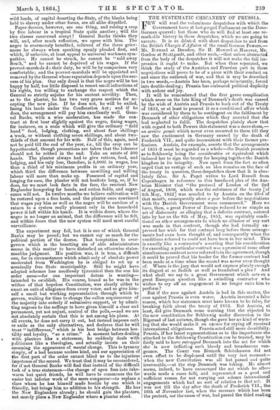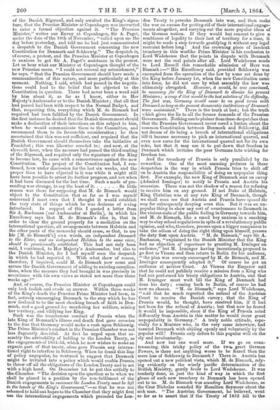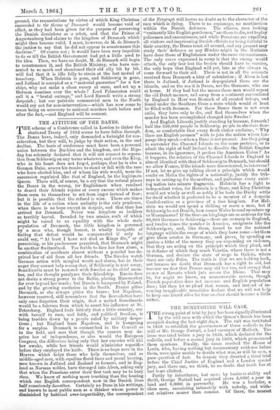THE SYSTEMATIC CHICANERY OF PRUSSIA.
It will be remembered that the first grave complication which arose on the late King of Denmark's death was caused by the wish of Austria and Prussia to back out of the Treaty of 1852, or at least to present it as a conditional affair which was considered by them to be contingent on the fulfilment by Denmark of other obligations which they asserted that she had neglected to fulfil. The despatches plainly show that with regard to both Powers this statement was a mere sham- an arriere pense'e which never even occurred to them till they saw the excitement in Germany caused by the death of Frederick VII., and quite inconsistent with their former pro- fessions. Austria, for example, asserts that the arrangements of 1851-2 must be regarded as a whole—the Danish promises as to Schleswig being the consideration or equivalent which induced her to sign the treaty for keeping together the Danish kingdom in its integrity. Now apart from the fact so often urged that no vestige of such an idea remains on the face of the treaty in question, these despatches show that it is abso- lutely false. Sir A. Paget writes to Lord Russell from Copenhagen in reference to this barefaced plea of the Aus- trian Minister that "the protocol of London of the 2nd of August, 1850, which was the substance of the treaty [of 8th May, 1852] was acceded to by Austria on the 23rd of that month, consequently above a year before the negotiations with the Danish Government were commenced." Here we have, then, a great Power of Europe reduced to so simple an act of dishonesty as alleging that a definite contract, entered into by her on the 8th of May, 1852, was equitably condi- tional on other arrangements to which no allusion of any sort was made in that contract, though she had formally ex- pressed her wish for that contract long before these arrange- ments had even been thought of, and consequently when the conditions referred to could not have been in her mind. This is exactly like a contractor's asserting that his consideration for executing a particular contract was a promise of some other simultaneous contract never referred to in the agreement, though it could be proved that his tender for the former contract had been made at a time when the second was never even thought of. Where is the jury that would not express plainly enough its disgust at so foolish as well as fraudulent a plea ? And what shall we say to a great Government which acts on a great European question like a swindling contractor who wishes to cry off an engagement it no longer suits him to perform ? But if the case against Austria is bad in this matter, the case against Prussia is even worse. Austria invented a false reason, which her statesmen must have known to be false, for breaking faith about the treaty of 1852. But Austria, at least, did give Denmark some warning that she objected to the new constitution for Schleswig under discussion in the Rigsraad of last autumn, though she gave her no kind of warn- ing that she would make it an excuse for crying off received international obligations. Prussia acted still more deceitfully. Prussia, if her latest representations as to the importance she attached to the Schleswig Constitution can be trusted, may be fairly said to have entrapped Denmark into the act for which she is now inflicting such bloody and treacherous ven- geance. The Count von Bismark SchOnhausen did not even affect to be displeased until the very last moment— when the new Constitution was all but passed and quite irrevocable,—at the step Denmark was taking. He almost seems, indeed, to have encouraged the act which ho after- wards made a casus UM, and represented as a good and sufficient reason for not carrying out solemn international engagements which had no sort of relation to that act. It was not till the day after the death of Frederick VII., the 16th of November last, when the measure which has been the pretext, not the cause of war, had passed the third reading of the Danish Rigsraad, and only awaited the King's signa ture, that the Prussian Minister at Copenhagen was instructed to enter a formal objection against it. "The Prussian Minister," writes our Envoy at Copenhagen, Sir A. Paget, under the date of the 18th of November, " called upon me the day before yesterday, and told me he had. just communicated a despatch to the Danish Government concerning the new Constitution for Denmark and Schleswig." The despatch is, of course, a protest, and the Prussian Minister at Copenhagen is anxious to get Sir A. Paget's assistance in the protest. Let us hear what our Minister at Copenhagen thought of the new Prussian move. " I could not conceal my astonishment," he says, " that the Prussian Government should have made a communication of this nature, and more particularly at this moment. Nothing, I said, which had passed in the -negotia- tions could lead to the belief that he objected to the Constitution in question. There had never been a word said by him about it, as far as I know, either to Her Majesty's Ambassador or to the Danish Minister; that all that had passed had been with respect to the Normal Budget, and that, respecting this, everything which M. de Bismark had required had been fulfilled by the Danish Government. In the first instance he desired that the Danish Government should make a declaration of their intentions. on this subject to him, when he would communicate them to the Committee, and recommend them to its favourable consideration ; he then ascertained that this was not sufficient, and required that the Danish Government should themselves take the initiative at Frankfort ; this was likewise acceded to; and now, at the eleventh hour, when the measure had passed the third reading of the Itigsraad, and required only the signature of the King to become law, he came with a remonstrance against the new Constitution. The project of the Constitution had, I con- tinued, been under discussion for the last six weeks, and the proper time to have objected to it was while it might still have been possible to arrest its further progress, and not when it had been discussed for the last time. Such a mode of pro- ceeding was strange, to say the least of it. So little reason was there for supposing that M. de Bismark would object to the Constitution that as far as I was myself concerned I must own that I thought it would establish the very state of things which he was desirous of seeing introduced. In support of this I quoted a letter from Sir A. Buchanan [our Ambassador at Berlin], in which his Excellency says that M. de Bismark's idea is, that in order to clear the ground properly for a mediation on the international question, all arrangements between Holstein and the other parts of the monarchy should cease, so that, to use his [M. de Bismark's] own words, an independent Denmark to the Eider, and an independent ilolstein to the same river, should be provisionally established. This had not only been said, I continued, to Her Majesty's Ambassador, but also to the Danish Minister, for I had myself seen the despatch in which he had reported it. With what show of reason, therefore, I inquired, could M. de Bismark now come and accuse the Danish Government of adding to existing complica- tions, when the measure they had brought in was precisely in accordance with his own views as stated not more than three weeks ago ?"
And, of course, the Prussian Minister at Copenhagen could only look foolish and evade an answer. Within three weeks of the King's death the Prussian Prime Minister had been, in fact, actively encouraging Denmark to the step which he has now declared to be the most shocking breach of faith in Den- mark, and a good ground for murdering her soldiers, seizing her territory, and vilifying her King. Such was the treacherous conduct of Prussia when the late King of Denmark's illness and death first gave occasion to the fear that Germany would make a rush upon Schleswig. The Prime Minister's conduct in the Prussian Chamber was not less flagrantly deceitful. At first he urged upon that as- sembly the advisability of holding to the London Treaty, as the engagements of 1851-52, which he now wishes to make an organic part of that treaty, alone gave Prussia any interna- tional right to interfere in Schleswig. When he found this line of policy unpopular, he ventured to suggest that Denmark might be irritated into a policy which would enable Prussia to throw off all the obligations of the London Treaty and to act with a high hand. On December 1st he put this artfully to the.Chamber. " The decision upon the question as to when we shall be placed in a position by the non-fulfilment of the Danish engagements to renounce the London Treaty must be left in the hands of the King's Government,"—so that he was not ashamed to hold out hopes to the Chamber that they might first use the international engagements which preceded the Lon- don Treaty to provoke Denmark into war, and then make the war an excuse for getting rid of their international engage- ments altogether, and carrying out the more popular ideas of the German nation. If they would but consent to give a semblance of legality to their lust of territory. for a time, it might be made a step towards gratifying it without any legal restraint before long And the crowning piece of insolent treachery in this warlike Prime Minister is his confession to Lord Wodehouse that the points in dispute with Denmark were not the real points after all. Lord Wodehouse sends to Lord Russell this remarkable admission of Herr von Bismark :—" His Excellency said, provided Schleswig was exempted from the operation of the law by some act done by the King before January 1st, when the new Constitution came into force, he did not care by what assembly the law was ultimately abrogated. However, it would, he was convinced, be necessary for the King of Denmark to dismiss his present Ministers; a coup d' Hat would be the best solution of the difficulty. The fact was, Germany would never be on good terms with Denmark so long as the present democratic institutions of Denmark- w were maintained." There is the truth at last; but the truth a hich gives the lie to all the former demands of the Prussian Government: Nothing can beplainer from these despatches than that the Prussian Government never cared a button about the common Constitution between Denmark and Schleswig, did not dream of its being a breach of international obligations till-it became necessary to pick an international quarrel, and even now cares for the international quarrel not for its own sake, but that it may use it to put down that freedom in Denmark which irritates the poor Germans into wishing for freedom too.
And the treachery of Prussia is only paralleled by its cowardice. One of the most amusing pictures in these despatches is the way in which Prussia tries to shift off on to Austria the responsibility of doing an unpopular thing first. For example, the new King of Denmark sent an envoy (Admiral Irminger) to notify to Prussia and Austria his accession. There was not the shadow of a reason for refusing to receive him on any ground. If not Duke of Holstein, King Christian was at any rate King of Denmark, though we shall soon see that Austria and Prussia have opened the- way for subsequently denying even this. But it was an un- popular thing to show any sort of countenance to Denmark in the vicious state of the public feeling in Germany towards him, and M. de Bismark, like a small boy anxious in a sneaking way to obey school regulations in spite of a revolutionary public opinion, and who, therefore, presses upon a bigger companion to take the odium of doing the right thing upon himself, presses the duty first upon Austria. " M. de Bismark," says Sir A. Buchanan, "explained to the Danish Minister that the King had no objection of importance to granting M. Irminger an audience," but M. Irminger having incautiously proposed to go first to Vienna and then return to Berlin for his audience, " the plan was warmly encouraged by M. de Bismark, and M. Irminger consequently adopted it." Of course he got an audience at neither Court. At Vienna the Emperor said that he could not publicly receive a mission from a King who had not performed his treaty obligations to Austria, and that M. Irminger must wait till the King of Denmark had done his duty ; coming back to Berlin, of course he had now no chance. "M. de Bismark," says Lord Wodehouse, " said that he much regretted the refusal of the Austrian Court to receive the Danish envoy; that the King of Prussia would, he thought, have received him, if it had not been for the refusal of Austria; but that now he feared. it would be impossible, since if the King of Prussia acted differently from Austria in this matter he would incur great unpopularity in Germany." A truly noble attitude, espe- cially for a Minister who, in the very same interview, had taunted Denmark with abiding openly and voluntarily by the popular will! Prussia only defers to this popular will on the sly and involuntarily.
And now but one word more. If we go on coun- tenancing, this tricky policy of the two,. great German Powers, is there not anything worse to be feared than the mere loss of Schleswig to Denmark ? There is Austria has opened out a new political vista, which M. de Bismark, rely- ing evidently on the wisely pacific determination of the- British Ministry, gently broke to Lord Wodehouse. It was tenderly done, in just the kind of way in which the first gleam of each new treachery to Denmark has been opened. out to us. M. de Bismark was sounding Lord Wodehouse, as. the Czar Nicholas sounded Sir Hamilton Seymour about the sick man. " The Austrian Government, he believed, went so far as to assert that if the Treaty of 1852 fell to the ground, the renunciations by virtue of which King Christian succeeded to the throne of Denmark would become void of effect, as they had been given for the purpose of preserving the Danish dominions as a whole, and that the Prince of Augustenburg had claims to the kingdom of Denmark which might then become valid. I must, however, do M. de Bismark the justice to say that he did not appear to countenance this doctrine." Of course not ; it would have been very impolitic to do so till the British Government had got a little used to the idea. Then, we have no doubt, M. de Bismark will begin to countenance it, and the British Ministry, who have con- sented to so much and abandoned their old ally bit by bit, will feel that it is idle folly to strain at the last morsel of treachery. When Holstein is gone, and Schleswig is gone, and Jutland is occupied as a "material guarantee" for a few ships, why not make a clean sweep at once, and set up a German nominee over the whole ? Lord Palmerston could call it a "brutal outrage," and Lord Russell write a strong despatch ; but our patriotic commercial men in the North would cry out for non-intervention—which has now come to mean being an accessory to national murders both before and after the fact,—and England will be content.
































 Previous page
Previous page